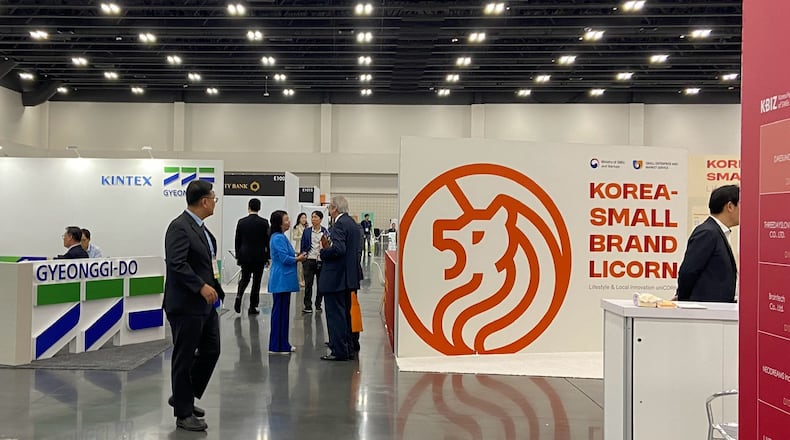In front of a room of more than 100 business owners seated at the Gas South Convention Center, Kelly Loeffler assured the audience that the Small Business Administration supports cross-border investment and partnerships between American and South Korean companies.
Loeffler, a former Georgia U.S. senator who is now head of the SBA, was one of several keynote speakers Thursday at the opening ceremony of the World Korean Business Convention in Duluth, one of the largest global trade events for Korean businesses. This is the second time in its 20-plus-year run it has been held in the U.S., following its stateside debut in California in 2023.
This year’s convention unfolds against the backdrop of longtime U.S. ally South Korea facing the possibility of a 25% tariff on its exports, a fact hard to shake amid remarks from business leaders, performances from opera singers and a teenage choir group singing hits from “Mamma Mia!”
Credit: AP
Credit: AP
Tariffs weren’t expressly mentioned by Loeffler, but she outlined President Donald Trump’s agenda to “unleash American energy, secure our borders and stand up to foreign adversaries who have exploited U.S. trade practices for far too long.”
“This agenda is already working,” Loeffler said during the ceremony, “And we’re grateful to have so many trading partners at the table to make sure that we can continue our great relationships.”
“As the two countries work toward a stronger fair trade agreement, they are laying the foundation for even greater investment and shared success,” Loeffler said.
South Korea’s minister of small-to-medium sized enterprises and startups, Oh Youngju, read remarks during the ceremony on behalf of acting President of Korea Han Duck-soo, who said he and Trump had a productive phone call last week. During they call they reaffirmed their commitment to work closely on “enhancing economic cooperation and trade balance,” as well as strengthening the Korea-U.S. alliance, according to the remarks Oh read.
Tariffs are a tax on imported goods. In early April, Trump imposed a 10% tariff on all countries and announced individualized rates on other nations with which the U.S. has the largest trade deficits, including South Korea. The individualized higher tariffs are paused amid trade discussions.
Shortly after Trump announced the proposed 25% reciprocal tariff on Korea, Han said the government was preparing support measures for the auto sector and would seek negotiations with the Trump administration, according to Reuters. South Korea is one of several countries U.S. Treasury Secretary Scott Bessent has said Washington would sit down with to discuss tariffs imposed by Trump.
South Korea is Asia’s fourth largest economy and a major exporter to the United States. Several Korean manufacturers have built plants in Georgia over the last five years, including Hyundai, SK Battery and QCells. Patched in via prerecorded video, Georgia Gov. Brian Kemp said the state’s relationship with Korea extends more than five decades.
Korean companies weigh potential tariff impact
Byungchul Na with Kwang Steel was one of the small and medium-sized business owners who set up booths at the convention to seek business with the U.S. Kwang Steel, which manufactures prefabricated construction materials designed to protect buildings against natural disasters, including metal cladding panels, has applied for a patent on a type of metal panel cladding in the U.S. and Korea.
Through an interpreter, Na said the tariffs are a major concern for him and other companies trying to enter the U.S. market. He gives kudos to larger companies that have already established a manufacturing plant in the U.S. before the Trump administration resumed office, such as Hyundai or SK Battery.
“The consumer will look at the end cost,” Na said through his interpreter. “If direct competition has the same or a similar product (priced) much less, then they’re not going to use it. There’s no reason to even come to America at that point without adjusting (the) price in order to make it competitive with the tariff costs.”
Another company in attendance, CNT Tech, has a program that provides support services to small businesses looking to expand, including entering the U.S. and other foreign markets. Through an interpreter, the program’s operator Lee Eunseong said the companies they represent are worried about the tariffs. About 30% of the 62 companies they are representing in the exhibition hall already export to the U.S., and 80% export to other countries.
Lee said the program is not doing anything to prepare for the tariffs just yet because the strategy is changing so frequently.
“Their active wish is to be present globally,” Lee said through his translator, referring to the companies he represents. “But if we have these kinds of policies and strategies, they might have some impacts on them entering the market.”
About the Author
Keep Reading
The Latest
Featured





